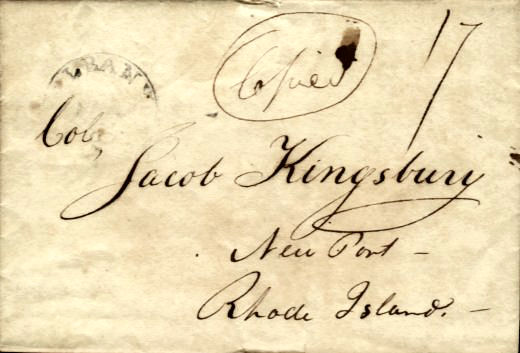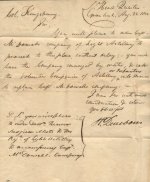![]()
Postal History Introduction
Stampless
Covers
1846
to 1900 Issues
1901-1950
Issues
1951-2003
Issues
Cancels
&
Miscellaneous
Postal
Stationery
Post
Cards
Air
Mail
First
Day &
Event Covers
Parcel Post/Special Delivery
Registered & Official Mail
Commercial & Advertising
Revenue & Postage Due
Wildlife & Game Issues
Complete List of RI Issues
|
Rhode Island Stampless
Covers & Letters |
||
|
||
|
Albany, NY Cancel with 17 Cent Rate of 1799 for Distance Under 300 Miles |
||
|
This August 22, 1812
letter is a request for additional troops. The letter was sent
from General Henry Dearborn, commanding the Northern Department
of the Army headquartered near Albany, New York to Colonel Jacob
Kingsbury in Newport, Rhode Island. In addition to the request
for Captain McDowell's company of Light Artillery; the general
is also requesting that Doctor Turner,
(Army Surgeon's Mate)
join McDowell's company and accompany the troops to Albany. |
||
|
Colonel Jacob Kingsbury
Jacob Kingsbury was born in 1755 at Norwich, Connecticut. Jacob was 20 years old in 1775 when he enlisted as a private in the Continental Army. Kingsbury was commissioned a Lieutenant of Infantry on September 29, 1789 and served under General "Mad Anthony" Wayne during the Indian Wars (1792-95). During the next 17 years, Kingsbury remained in the Army, rising to the rank of Colonel and serving in various commands at Detroit, Mackinac, Bellefontaine, and New Orleans. On June 23, 1812, General Dearborn appointed Colonel Kingsbury to the command of United States troops, militia and fortifications at Newport, Rhode Island. On July 17, 1812, Colonel Kingsbury's command was extended to include the entire seacoast of Rhode Island and Connecticut. Kingsbury was appointed as Colonel Inspector-General on April 8, 1813. On June 15, he retired from active military service and moved to Missouri. Colonel Jacob Kingsbury died on July 1, 1837 in Franklin, Missouri. General Henry Dearborn Henry Dearborn was born on February 23, 1751 in Hampton, New Hampshire. He attended school at the Hampton District School and later studied medicine under Dr. Hall Jackson at Portsmouth, New Hampshire. He opened his practice there in 1772. In April of 1775, after word of the battles at Lexington and Concord reached him; Dearborn and a group of sixty local militia men he had organized, headed for Cambridge, Massachusetts where they joined with Colonel John Stark's first New Hampshire Regiment. Dearborn then returned to New Hampshire, was appointed a captain in Colonel Stark's regiment, recruited another full company of militia and returned to Cambridge at the end of May. On June 17, 1775 Captain Dearborn fought under Colonel Stark's command at the Battle of Bunker Hill. Captain Dearborn served under General Benedict Arnold in 1775 and took part in the attempt to capture Quebec, where he was captured and imprisoned. He was exchanged as a Prisoner of War in March 1777 and appointed to the rank of Major in the Third New Hampshire Regiment under Colonel Scammell. In 1777, Major Dearborn fought at the battles of Ticonderoga and Freeman's Farm against General Burgoyne's forces, (where he was appointed Lieutenant Colonel) and then spent the winter with General Washington at Valley Forge. He fought at the Battle of Monmouth in 1778 and was part of General Sullivan's force at the Battle of Newtown in 1779. He returned to serve on General Washington's staff in 1780 and took part in the siege and defeat of General Cornwallis at Yorktown in 1781. Colonel Dearborn was discharged from the army in 1783 and settled in Kennebec, Maine where he was appointed a Major General of Militia. Dearborn served as a member of the United States House of Representatives from 1793 until 1797. He served as Secretary of War under President Thomas Jefferson from 1800 to 1808 and was instrumental in the planning for the removal of Eastern Indian Tribes to "West of the Mississippi." He resigned as Secretary in 1808 and accepted the post of Collector for the Port of Boston in 1809. General Dearborn was recalled to active military service in 1812 by President James Madison, appointed as the Senior Major General of the American Army and given command of the Northern Department. However, the old Revolutionary War commander proved ineffective in his new command. He was relieved and replaced by General Morgan Lewis and given the command of New York City. General Dearborn retired from the Army on June 15, 1815. He served as Minister to Portugal from 1822 to 1824 and then retired to Roxbury, Massachusetts where he passed away at the home of his son on June 6, 1829. Doctor Turner & Captain McDowell I was unable to find any pertinent
references for Captain McDowell, Light
Artillery-War of 1812 and the only reference to a Doctor
Turner in the War of 1812 was on the Surgeon
General's Office of Medical History Website as
follows: Rhode Island and the War of 1812 Rhode Island as well as most of New England was opposed to "Mr. Madison's War," believing that it interfered with their commerce. New England Federalists met at a convention in Hartford, Connecticut in 1815 and drafted a series of constitutional amendments prohibiting embargos lasting more than 60 days. The war ended before these proposals could be presented to Congress. (Some members of the convention even proposed succeeding from the Union.) Rhode Island's congressional
delegation voted against the war and was one of the states
considering secession from the Union in 1815. However, Rhode
Island did finally contribute a force of 500 militia to the
war and provided local troops to garrison Fort Adams in
Newport. In addition, Commodore Oliver Hazard
Perry of Wakefield, Rhode Island became a
"National Hero" with his victory over the British
fleet at the Battle of Lake Erie. |
||
| TEXT OF
LETTER FOLLOWS:
Headquarters
Col Kingsbury |
|
|
P.S. You will please to order Doctor Turner, Surgeons Mate to the Reg. of Light Artillery to accompany Capt McDowells Company |
I
am Sir with much consideration & esteem Your Obliged H. Dearborn |

RI Historical
Society
Introduction
Stampless I
Stampless II
Stampless III
Stampless IV
Stampless V
Stampless VI
Brown & Ives Letters
The Hazard Family Letters
Joseph Tillinghast
Free Franked Letters
DeWolf Family Letters
Recently Added Pages

